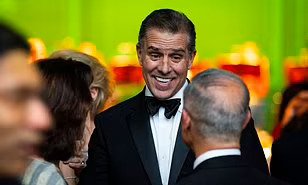Vladimir Putin thought he could conquer Ukraine in a few days. But now his grip on power in Russia itself is wavering after 48 hours of chaos.
Even after rebel leader Yevgeny Prigozhin’s sudden decision to withdraw his troops from their advance on Moscow, the brutal truth is that this mutiny has dramatically destabilized Putin’s 23-year tenure in the Kremlin. It could collapse now that its aura of invincibility and control has been shattered beyond repair.
For two decades, the word of the 70-year-old has been the law in Russia. But the decision of his former protégé Prigozhin to rebel against his master, coupled with the Ukrainians’ heroic resistance to the invasion, has exposed the incompetent and corrupt nature of his military apparatus.
Not since the Russian army went on strike in 1917 and left World War I has the Russian state from the armed base of its power faced such a challenge to its authority.
Putin is haunted by history. The evidence for this was how he said in his TV speech yesterday that the grim years of revolution and civil war after 1917 threatened to return. But what he did not admit was that Russia’s slide into crisis is a direct product of his own policies.
Behind the facade of unbroken lines of soldiers running across Red Square alongside intercontinental nuclear missiles, Russia has been a quagmire of corruption and cronyism.
Instead of modernizing Russia, Putin has allowed a repeat of the internal struggle for power between warlords that dates back 400 years. The fact that his former friend Prigozhin was able to secure a lucrative fiefdom for himself and then raise his own mercenary army alongside the official Russian army is an extraordinary insight into how Putin has eroded the authority of the Russian state.
Putin thought he was smart to give Prigozhin so much freedom and a force to deploy in the undeclared war in eastern Ukraine after 2014 and in Africa, where several regimes have employed Wagner mercenaries to rise to power. to stay.
Such freelance activities also served the Kremlin’s efforts to reduce Western influence on the African continent. However, that strategy has come back to bite Putin.
Prigozhin’s promotion as a warlord was designed to protect the president from a possible coup d’état against him by the Russian military. But it turned Prigozhin into a Frankenstein’s monster.
Moreover, the Wagner Group is not Russia’s only private militia. Ramzan Kadyrov, the boss of the southern Chechen Republic, has tens of thousands of armed men and says he will support Putin – but at what political cost?
The massive gas company Gazprom says it is recruiting a private militia to fight in Ukraine, but perhaps it’s actually doing so to give its billionaire bosses some leverage in Russian politics. By sponsoring these warlords as guarantors of his power and then failing to quell Prigozhin’s increasingly vocal insubordination, Putin has allowed this crisis to spiral out of control.
Few will cry when he falls from power. But it’s too early to crow.

No one should be naive and think that any new Russian leader would automatically be better.
For their part, it is understandable that the Ukrainians hope that liberation is near when the Russians quarrel among themselves. But the chilling truth is that Prigozhin has made it clear that he is rebelling because the aggression against Ukraine has been mismanaged, not because it is a war crime. Prigozhin’s unbridled brutality means that if he succeeds in bending the Russian state and military to his will, the war against Ukraine could plunge into new depths of horror.
So far, Putin has roared about using nuclear weapons, but don’t count on a criminal like Prigozhin holding back. For this is a man who has used a sledgehammer to strike the head of a rebellious soldier.
Would such a beast bother to think about the consequences before unleashing nuclear weapons on the world?
Make no mistake, the fate of Russia’s vast nuclear arsenal is now at stake. As bad as Putin’s regime has been for Russia and the world, a new power struggle for control of the Kremlin threatens to push the world to the brink of nuclear catastrophe. We have never witnessed a civil war in a nuclear-armed state.
Unfortunately, the Russian people are passive spectators of this power struggle. TV footage of a street sweeper diligently clearing rubbish among rebel tanks in the city of Rostov, without looking up, epitomizes the political passivity of so many Russians.
Until the Russian people stand up for themselves, the fall of Putin will not free the country’s 143 million inhabitants, or their neighbors, from the threat of arbitrary and brutal action by anyone in the Kremlin.
Nuclear-armed anarchy is a terrifying prospect. In practice, however, there is little the West can do to bring the situation under control.
However, much Putin deserves a grim reckoning, those who might still overthrow him are even less predictable and self-controlled. Yesterday’s chaos suggests that his impending fall would still herald a worse time of trouble for all of us.












